Early Life and Scouting Principles
Born on September 6, 1921, in Atlantic City, New Jersey, Norman Joseph Woodland displayed an early interest in science and technology. Growing up during a time when the world was rapidly changing, he was inspired by the principles of scouting: being prepared, resourceful, and forward-thinking. These values undoubtedly shaped his approach to problem-solving and invention.
The Birth of an Idea
The story of the barcode’s invention began with a simple yet profound observation. While studying mechanical engineering at Drexel Institute of Technology, Woodland was inspired by a conversation with a supermarket executive who wished for a more efficient way to capture product information. Recalling his knowledge of Morse code from his Boy Scout days, Woodland had a moment of clarity while sitting on a Florida beach in 1948. He drew lines in the sand to illustrate his idea, transforming the dots and dashes of Morse code into a series of lines and spaces that could be read by a machine.
The Path to Innovation
Just like a scout facing the challenges of a wilderness trail, Woodland encountered numerous obstacles on his path to bringing the barcode to life. With perseverance and the help of a fellow Drexel classmate, Bernard Silver, he refined his idea and worked tirelessly to develop the technology required to read and print the codes. Their persistence paid off in 1952 when they were awarded U.S. Patent 2,612,994 for their invention.
Impact and Legacy
The invention of the barcode embodies the scout motto of “Be Prepared.” This simple yet powerful innovation prepared industries for a future where efficiency and accuracy in data collection would become paramount. The barcode revolutionized inventory management, retail, manufacturing, and even the healthcare industry, enabling faster checkouts, better tracking of products, and more accurate data collection.
Norman Joseph Woodland’s ingenuity and dedication mirror the scout law’s call for scouts to be trustworthy, loyal, helpful, and brave. His work not only addressed a significant problem of his time but also laid the groundwork for future advancements in technology. The impact of his invention is a testament to what one can achieve by staying true to the principles of scouting—thinking ahead, working diligently, and always seeking to improve the world around them.
A Scout’s Legacy
Woodland’s life and work serve as a powerful example to scouts everywhere. His journey from a simple idea drawn in the sand to a globally transformative technology reminds us that innovation often starts with a small, inspired thought and grows through persistence and a commitment to solving real-world problems. Norman Joseph Woodland’s legacy is not just in the ubiquitous black and white stripes of the barcode but in the enduring spirit of innovation and preparedness that he personified.

